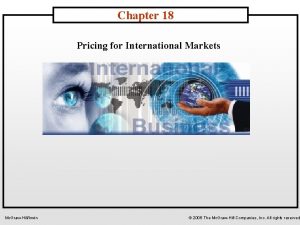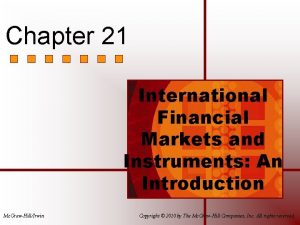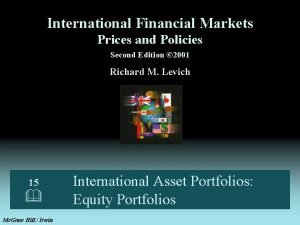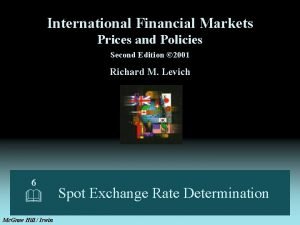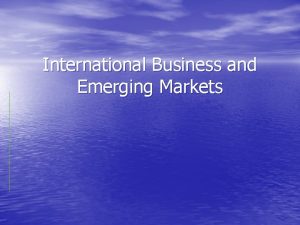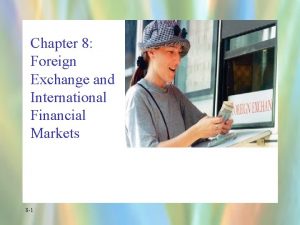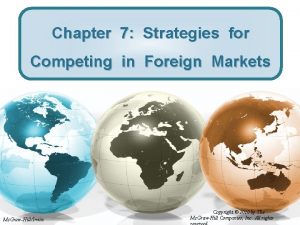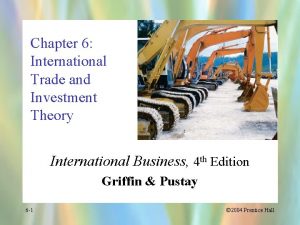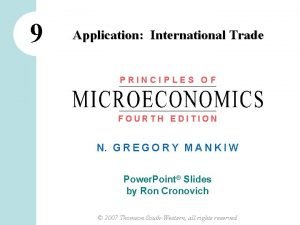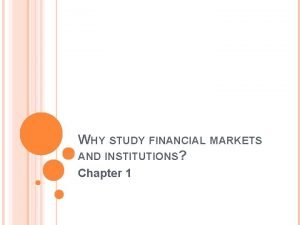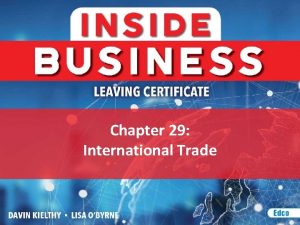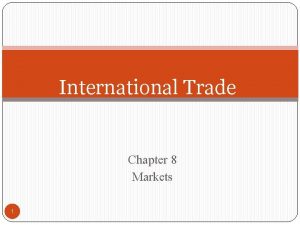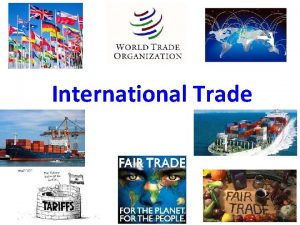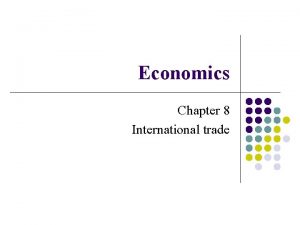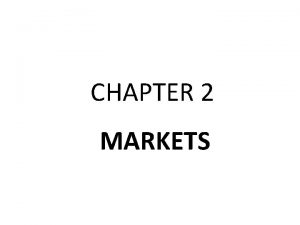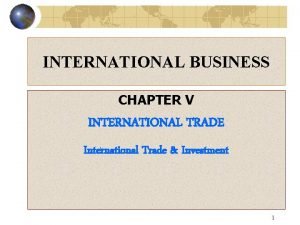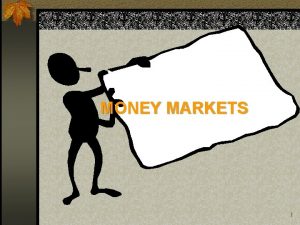International Trade Chapter 8 Markets 1 International Trade










- Slides: 10

International Trade Chapter 8 Markets 1

International Trade Concepts International Trade The exchange of goods and services taking place across international boundaries. Open Economy An economy engaged in international trade. Closed Economy An economy that is not engaged in international trade. Autarky A situation in which a country does no foreign trade. 2

Gains From Trade/Advantages from Trade will benefit individuals, groups, regions, and countries. Without trade, every person has to be self sufficient , so he/she has to produce everything food, clothes, shelter, etc. which is impossible. Trade among nations allows them to concentrate on producing and specialising in a certain good or service, that they will produce efficiently. At the same time, they will obtain the goods and services that they do not produce efficiently from their trading partners. Trade allows smaller countries to specialize and produce a few products at high enough levels of output to reap the available economies of scale. Learning by Doing: a country gain experience in producing a good over time so it will become efficient in producing it. Absolute Advantage A country that has an absolute advantage over another country means that it can produce more of good X with fewer resources/factors of production, lower cost, and more efficiency. Comparativ The opportunity cost tells us how much of one good we have to give up in order to produce one or more unit of the other. e Advantage So a country has a comparative advantage over another country when the opportunity cost of production in the country is lower than its trading partner. 3

How Can a Country Protect its Domestic/Local Industries from Foreign Competition? Protectionism: Government protection to domestic industries from foreign competition. Such governmental policies are referred to as Commercial Policies. Types of governmental trade policies include: : Tariffs: Taxes designed to raise the price of foreign goods. Non-tariff Barriers: Devices other than tariffs designed to reduce the flow of imports such as quotas and customs. Governments use protectionism to protect their National Income (NI): (1) Protecting infant industries. (2) Protecting country against unfair actions by foreign firms and foreign governments (for example, protecting against dumping of wastes in developing countries) (3) Encouraging learning by doing. (4) Creating and exploiting strategic trade advantages 4

How Can a Country Protect its Domestic/Local Industries from Foreign Competition? Governments sometimes use protectionism to protect national objectives other than total income. (1) National Defense (2) Protection of Specific Groups (3) Small countries risk specialisation because they will have to stick to the production of a few products. Governments protect weak industries by tariffs to encourage diversification. 5

Multinational Corporations (MNCs) Chapter Ten Markets

Important Definitions: Foreign Direct Investment (FDI) FDI refers to long term participation by country A into country B. It usually involves the transfer of foreign money into the recipient country from multinational corporations. Mutli-National A business that either owns or controls foreign subsidiaries in Corporation/Enter more than one country. prise (MNC/MNE) MNCs are very important nowadays as major providers of FDI often using capital which has been raised from their home countries. MNCs and FDI usually deal with direct investment. Direct investment and management go together. The potential gains of FDI must outweigh the negatives of establishing and operating in a foreign country such as communication difficulties, ignorance of institutions.

Two Theories of Direct Investment: A. B. The Product Cycle Hypothesis Market Imperfections/Barriers and FDI

Two Theories of Direct Investments: A. Product Cycle Hypothesis � Economist Vernon has emphasized that a firm tends to become multinational at a certain stage in its growth. � Early Stages of Product Cycle: There is an initial expansion to overseas markets, by expanding in exports. � Next Stages: Because countries are at different stages of economic development, receive new separated by a technology gap, new markets are available to products by richer countries. Then, such MNCs standardize their production process and acquire close contacts with the market and with the suppliers. � Next Stage: MNCs may then decide to look overseas for the lower-cost locations and new markets.

Two Theories of Direct Investments: B. Market Imperfections/Barriers and FDI Barriers to trade and FDI such as high transport costs. If transport costs are high then MNCs make the expansion of their plants and production in their home countries, and then export what they have produced to other countries rather than building plants in other countries. Dunning’s Eclectic Theory (OLI Paradigm Theory) The OLI shows three conditions that determine whether a MNC will be a source of FDI. O: Ownership advantages specific t to the firm. L: Locational considerations; which place offers lower transport costs, and lower raw material costs. I: International gains: Is it more profitable to invest in foreign countries or should the MNC stick to its domestic country. Taxation and the Transfer Pricing Problem Taxation policies in source and host countries will affect the flow of FDI. A country with low profit taxes will attract FID inflows. Control To the host country, this means that part of its industry will be controlled by foreigners. Many host countries find this difficult to accept. External Benefits of FDI to the Host Country Training the local labor with more sophisticated techniques. Research and Development (R & D) entering into the host country.
 Contrasting international markets
Contrasting international markets Pricing for international markets
Pricing for international markets International financial markets and instruments
International financial markets and instruments Levich international financial markets
Levich international financial markets International financial markets levich
International financial markets levich Challenges of international business in emerging markets
Challenges of international business in emerging markets Types of exchange rate
Types of exchange rate Strategies for competing in international markets
Strategies for competing in international markets Firm based trade theory
Firm based trade theory Chapter 9 application: international trade answers
Chapter 9 application: international trade answers Why study financial markets and institutions chapter 1
Why study financial markets and institutions chapter 1

